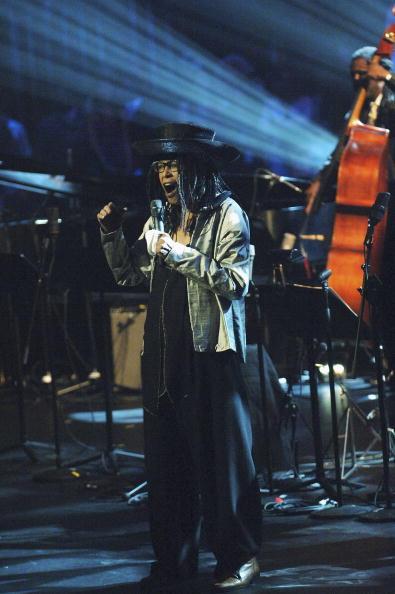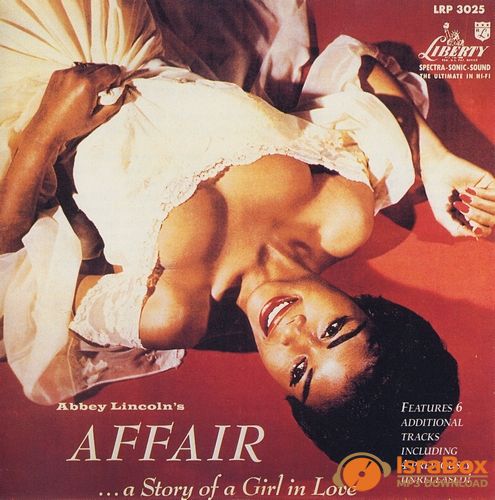'I Made My Life Mine'
An Appreciation of Abbey Lincoln, who was one of a kind—as was always her goal
By Martin JohnsonGoing to a jazz show is usually about hearing this piano player or that saxophonist, but attending a performance by vocalist Abbey Lincoln was about performing a pilgrimage: It was about the confirmation of shared truths and a glimpse of the potential of those ideas. She died August 14 at age 80 in New York.
Lincoln could make large concert halls seem intimate, and she made small jazz clubs feel like a living room. At her best, she held her audience rapt; there was a bright flame that burned inside her, and if you paid close enough attention, she would share it.
Abbey Lincoln found her inner flame early in life, and it burned brightly until the end. She was born Anna Marie Wooldridge in Chicago on August 6, 1930, the 10th of 12 children, and grew up in rural Michigan. Her pursuit of a show business career initially led her to the West Coast in the early 1950s, where she met Billie Holiday, whose plaintive style became a big influence, and Louis Armstrong. At the suggestion of her manager, she changed her name to Abbey Lincoln, which fused Westminster Abbey and Abraham Lincoln.
Lincoln's first recordings depicted her as a glamorous ingénue, and she acted in films that underscored that identity. She appeared in the Jayne Mansfield movie The Girl Can't Help It. Her first recording, Affair ... a Story of a Girl in Love (Liberty) intensified the sexy image with a sultry cover photo showing her in a sexy dress once worn by Marilyn Monroe. On her second recording, That's Him (Riverside), which was released in 1957, she began to change her image. She worked with drummer Max Roach and saxophonist Sonny Rollins. She married Roach in 1962, and by that time, they had already produced one of the most searing and profound jazz recordings ever made: We Insist! Max Roach's Freedom Now Suite (Candid). The recording was released in 1960 and depicted a lunch counter sit-in on the cover. The music was deep and rich, with Lincoln's vocals bringing to vivid life Oscar Brown's piercing, socially conscious lyrics. Her commanding alto provides a clarion call to resist oppression on some songs, and on others, her wordless guttural moans and anguished cries depict the inhumanity of slavery and other atrocities.
Roach and Lincoln collaborated on several other fine recordings, such as It's Time and Percussion Bittersweet (both on Impulse!), during their marriage, which ended in 1970. Lincoln continued to act, but rather than light roles, she starred in Ivan Dixon's landmark film, Nothing but a Man, and she shared the lead with Sidney Poitier in 1968’s For Love of Ivy. She also appeared on several TV shows, most notably Mission: Impossible in 1971 and All In the Family (which reunited her with her For the Love of Ivy co-star, Carroll O’Connor) in 1978.
Of her centerfold pose on the cover of her first album, Abbey Lincoln's Affair...a Story of a Girl in Love, Lincoln later explained: "I went along with [the cover pose] because I didn't know any better. I didn't think of myself as a serious artist—or as a serious person either. All I wanted was to be thought of as beautiful and desirable."
On a trip to Africa in 1972, Lincoln received two surnames, Aminata in Guinea and Moseka in Zaire. It became commonplace to refer to her as Abbey Lincoln Aminata Moseka during the '80s. Her work attracted the interest of French record producer Jean-Philippe Allard, and starting in 1990 they released nine discs that are nothing less than modern classics, including The World Is Falling Down, You Got to Pay the Band and Abbey Sings Abbey (all on Verve). Each disc was a showcase for Lincoln's magnificent vocals, and the recordings often featured other legends, such as saxophonist Stan Getz and pianist Hank Jones. Rather than dazzle with technique, Lincoln stunned with the intensity of her delivery and her poetic restraint. Her own songs, especially "Throw It Away" and "The World Is Falling Down," are poignant; the former counsels "you can never lose a thing if it belongs to you."
Lincoln was never renowned as a teacher like her peer Betty Carter, but on the bandstand, she was exacting. Alumni of her bands include such top players as drummer Alvester Garnett and pianists Marc Cary and Rodney Kendrick.
'Freedom Day,' from We Insist! Max Roach's Freedom Now Suite, 1960, the jazz anthem of the Civil Rights movement.Although she discarded the Hollywood version of glamour, Lincoln remained a style icon. She became well-known for her array of hats, and often wore dark ensembles highlighted by a superb use of colorful accessories. Her offstage demeanor was just as no-nonsense as it was onstage. Eighteen years ago we sat down for an interview over lunch for a Vogue piece about her and Carter, which ran in February '93 under the headline, "Presidents Carter and Lincoln."
She was eager to talk about her songwriting influences and her new recordings, but most memorably, she summed up her roller coaster of a career. "I made my life mine; that's what you're supposed to do," she said. "Too many people lead their lives to the tune of other people's ideas; I made my life mine."
Originally published in The Root, August 15, 2010; used by permission.
THE BLUEGRASS SPECIAL
Founder/Publisher/Editor: David McGee
Contributing Editors: Billy Altman, Laura Fissinger, Christopher Hill, Derk Richardson
Logo Design: John Mendelsohn (www.johnmendelsohn.com)
Website Design: Kieran McGee (www.kieranmcgee.com)
Staff Photographers: Audrey Harrod (Louisville, KY; www.flickr.com/audreyharrod), Alicia Zappier (New York)
E-mail: thebluegrassspecial@gmail.com
Mailing Address: David McGee, 201 W. 85 St.—5B, New York, NY 10024
Founder/Publisher/Editor: David McGee
Contributing Editors: Billy Altman, Laura Fissinger, Christopher Hill, Derk Richardson
Logo Design: John Mendelsohn (www.johnmendelsohn.com)
Website Design: Kieran McGee (www.kieranmcgee.com)
Staff Photographers: Audrey Harrod (Louisville, KY; www.flickr.com/audreyharrod), Alicia Zappier (New York)
E-mail: thebluegrassspecial@gmail.com
Mailing Address: David McGee, 201 W. 85 St.—5B, New York, NY 10024




